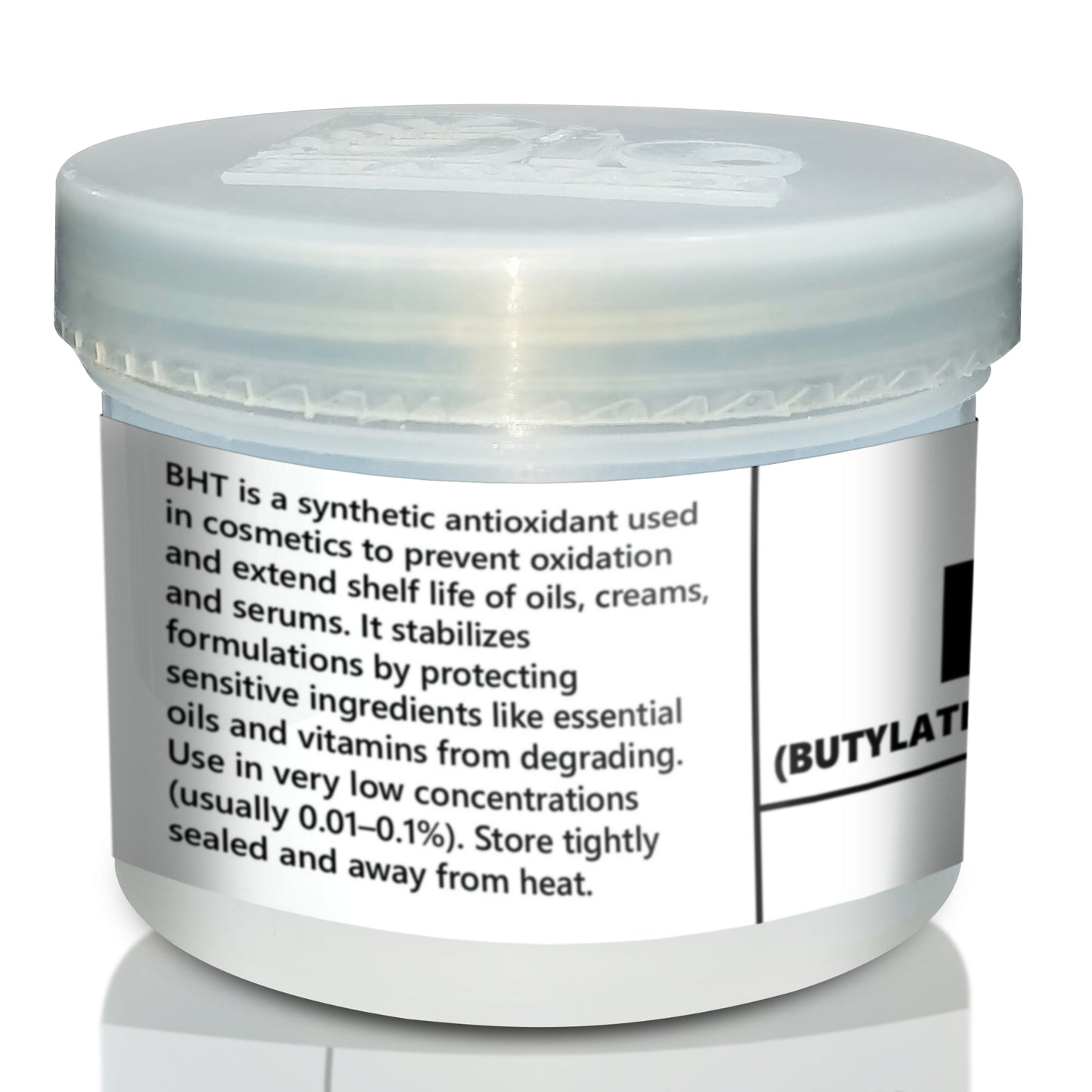Bio Shop
BHT (Butylated hydroxytoluene)
BHT (Butylated hydroxytoluene)
Key Functions: Functions as a potent antioxidant that stabilizes oils and active ingredients by preventing oxidation and rancidity.
Couldn't load pickup availability



Explore
Information About BHT (Butylated hydroxytoluene)
✅ Key Features
- Oil-soluble antioxidant for cosmetic and personal care formulations
- Prevents oxidation of fats, oils, and sensitive ingredients
- Extends shelf life and product stability
- Used in serums, emulsions, balms, and oil blends
- Works well with essential oils and plant-based actives
🔬 Description
BHT (Butylated Hydroxytoluene) is a synthetic antioxidant widely used in cosmetics to protect formulas from oxidative degradation. It’s especially effective in oil-based systems, including serums, balms, creams, and sunscreen products. By scavenging free radicals and inhibiting lipid peroxidation, BHT prevents rancidity, discoloration, and loss of efficacy in sensitive ingredients like essential oils, vitamins, and unsaturated fats. A small percentage significantly boosts product shelf life and sensory integrity.
📊 Technical Data
INCI Name: BHT (Butylated Hydroxytoluene)
CAS Number: 128-37-0
Solubility: Oil-soluble
Add Phase: Oil phase or cool-down
pH Stability: Stable across wide pH range
Processing Temperature: Add under 70°C
Appearance: White crystalline powder or flakes
Odor: Mild, slightly phenolic
Molecular Formula: C15H24O
Molecular Weight: 220.35 g/mol
Flash Point: ~127°C
Density: ~1.05 g/cm³
Chemical Type: Aromatic organic compound (phenol derivative)
Functional Groups: Hydroxy group, alkylated phenyl ring
Primary Cosmetic Uses: Antioxidant, preservative booster, stabilizer
🧪 Recommended Usage
- Usage Rate: 0.01% – 0.1%
- Phase: Add to oil phase or cool-down phase below 70°C
- Ideal For: Serums, Oils, Creams, Sunscreens, Balms, Lip Products
💡 Pro Tip
🧪 Add BHT at cool-down phase or below 70°C to avoid degradation. For antioxidant synergy, pair it with Vitamin E (Tocopherol) in oil blends and emulsions for boosted protection and longer shelf life.
👩🔬 Skin Type Compatibility
✔️ Safe for all skin types in recommended amounts
⚠️ Do not exceed maximum use level to avoid potential irritation
🧴 Formulation Ideas
1. Antioxidant Face Oil
Add 0.05% BHT to a blend of jojoba, rosehip, and vitamin E oils to preserve freshness and prevent oxidation.
2. Vitamin-Enriched Cream
Stabilize active ingredients like Vitamin A or CoQ10 by adding 0.02% BHT in the oil phase.
3. Lip Balm Stabilizer
Use 0.03% in wax-based lip balm formulas to prevent flavor and scent degradation.
4. Sunscreen Protection Base
Include BHT in formulations with chemical UV filters to reduce degradation under sunlight.
5. Massage Oil Blend
Add 0.05% to essential oil blends used for aromatherapy or spa formulations to extend shelf life.
💧 Cosmetic Suitability:
Serums
⭐⭐⭐⭐☆ – Good
🟩🟩🟩🟩⬜ – Boosts oil-phase stability and prevents oxidation.
Creams & Lotions
⭐⭐⭐⭐☆ – Good
🟩🟩🟩🟩⬜ – Preserves unsaturated oils and actives.
Toners
⭐☆☆☆☆ – Poor
🟥⬜⬜⬜⬜ – Not effective in water-based systems.
Face Masks
⭐⭐☆☆☆ – Fair
🟧🟧⬜⬜⬜ – Use only in oil-rich or creamy masks.
Cleansers
⭐⭐☆☆☆ – Fair
🟧🟧⬜⬜⬜ – Adds protection in cream or oil-based cleansers.
Hair Masks
⭐⭐⭐☆☆ – Moderate
🟧🟧🟧⬜⬜ – Stabilizes lipid-based hair treatments.
Deodorants
⭐⭐⭐☆☆ – Moderate
🟧🟧🟧⬜⬜ – Used in cream-based formulas with essential oils.
Eye Creams
⭐⭐⭐⭐☆ – Good
🟩🟩🟩🟩⬜ – Stabilizes retinol and fatty ingredients.
Shampoos
⭐☆☆☆☆ – Poor
🟥⬜⬜⬜⬜ – Not relevant for rinse-off water-based products.
Soaps
⭐⭐☆☆☆ – Fair
🟧🟧⬜⬜⬜ – Used in syndet bars with oils.
Conditioners
⭐⭐☆☆☆ – Fair
🟧🟧⬜⬜⬜ – Use in oil-rich or leave-in formats only.
Lip Balms
⭐⭐⭐⭐☆ – Good
🟩🟩🟩🟩⬜ – Prevents oil rancidity and flavor breakdown.
Body Butters
⭐⭐⭐⭐☆ – Good
🟩🟩🟩🟩⬜ – Stabilizes shea, cocoa, and nut oils.
Ointments
⭐⭐⭐⭐☆ – Good
🟩🟩🟩🟩⬜ – Extends shelf life of healing balms and salves.
❓ FAQs
Q1: Is BHT a preservative?
A1: No. It’s an antioxidant, not an antimicrobial. It stabilizes oils but doesn’t protect against microbial growth.
Q2: Is it safe for use in cosmetics?
A2: Yes, BHT is globally approved at low concentrations (usually <0.1%) and used in many commercial products.
Q3: Can I use BHT in water-based products?
A3: No. It is oil-soluble only and will not work in water-only formulations like toners.
Q4: Does BHT affect fragrance?
A4: No, it actually helps preserve fragrance quality by preventing oxidation.
Q5: What’s the difference between BHT and BHA?
A5: BHT is more oil-soluble and widely used in cosmetics, while BHA is less common in topical formulations.
📂 Documentation
Upon request, we will provide.
Where Can You Safely Use BHT (Butylated hydroxytoluene)
Discover how BHT (Butylated hydroxytoluene) performs across different products — rated for safety, stability, and effectiveness.




